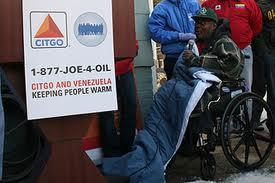This time of year in Boston, we’re used to seeing ex-Congressman Joe Kennedy on late-night TV, reminding us that “no one should be left out in the cold.” It’s a plug for the home heating oil assistance program run by his non-profit, Citizens Energy, in partnership with CITGO, the Houston-based oil refiner owned by PDVSA, Venezuela’s national petroleum company.
Now in its eighth year, the program began in 2005 as a response to fuel price hikes after Hurricanes Katrina and Rita. According to CITGO, it has helped more than 1.7 million poor and working families in the United States stay warm through the donation of 200 million gallons of Venezuelan heating oil worth more than $400 million.
 The program currently operates in 25 states and the District of Columbia, including 240 Native American tribal communities. This year, at least 100,000 families are expected to benefit. “Venezuela’s commitment to the poor transcends all boundaries, ideological and geographical,” said Claudia Salerno Caldera, Venezuela’s Vice Minister of Foreign Affairs for North America, at the kick-off for the 2013 program in Baltimore.
The program currently operates in 25 states and the District of Columbia, including 240 Native American tribal communities. This year, at least 100,000 families are expected to benefit. “Venezuela’s commitment to the poor transcends all boundaries, ideological and geographical,” said Claudia Salerno Caldera, Venezuela’s Vice Minister of Foreign Affairs for North America, at the kick-off for the 2013 program in Baltimore.
Of course, the goodwill generated by the program helps to counter the negative image of Hugo Chávez and Chavismo fostered by the US government and news media, an important goal of Venezuelan “oil diplomacy” in the United States. It’s always refreshing to hear Joe Kennedy in his TV spot thanking “CITGO and the people of Venezuela” for helping out, while the “biggest oil companies turned their backs" on families in need. This year (for the first time I can remember), Kennedy also explicitly thanked Hugo Chávez.
Venezuela’s fuel assistance is especially critical now that LIHEAP, the major federal low income fuel assistance program, has been cut by 32% (from $5.1 billion in 2009 to around $3 billion this year). Under sequestration starting March 1, another $177 million in cuts will go into effect. Even before the cuts, the program reached only an estimated 20% of eligible low income households.
As to the continuation of Venezuela’s oil largesse, uncertainties about the political future of Chavismo after Chávez, and about the strength of Venezuela’s economy, loom large. Chávez’s critics say the state should spend more at home before providing charity abroad, especially to the United States. Stagnating oil production, growing inflation, and a deficit estimated at 11% of GDP present economic challenges that may require curtailment of social spending.
The fate of Venezuela’s oil diplomacy is of even greater concern to some Caribbean and Latin American countries, whose preferential arrangements with Chavez over the years have become a key source of economic aid. For example, Cuba, the largest single recipient of Venezuela’s oil assistance, received 120,000 barrels per day last year, worth around $3.6 billion. In exchange, Cuba sends Venezuela medical doctors, sports trainers, and armed forces advisers as barter for 40-50% of the shipment’s market value. The remaining value is repaid at 1% interest over 25 years.
These favorable terms are not reserved solely for Chávez’s political allies. The Dominican Republic, a country firmly within the US political orbit, receives 50,000 barrels of crude per day from Venezuela which is refined at a domestic plant that Venezuela co-owns. The Dominican government sells the gasoline and other byproducts at market value, using the proceeds (around $500 million per year) for domestic programs. It repays Venezuela in part with black beans, sugar, and technical assistance, and the balance in cash over time, at 1% interest.
Nicaragua’s arrangement with Venezuela is similar to the Dominican model, with plans for a major oil refinery underway. Nicaragua sends Venezuela meat, sugar, coffee, beans, and manufactured clothing in partial payment for the oil it receives.
The popularity of these “oil diplomacy” programs goes a long way towards explaining the strong political leadership role that Chávez has played in the region. Still, according to some analysts, these favorable arrangements cost Venezuela an estimated $6 billion annually in unrealized revenues, compared to what it would receive by selling the oil at a market price—a cost that may not be permanently sustainable.
On a visit to Cuba last January, where Chávez was still convalescing, the island seemed obsessed with the state of his health—but anxiety over the future of Venezuela’s fuel aid lay just below the surface. For Cubans, the current situation evokes painful memories of the Soviet Union’s collapse in 1991, which devastated the Cuban economy almost overnight.
“They’re not just coming to pay their respects,” our savvy Cuban friend told us, referring to the parade of foreign dignitaries—from Cristina Fernández to Ollanta Humala to Fernando Lugo—who visited Chávez during the single week we were in Havana. “They’re here to shore up their oil deals.”
Emily Achtenberg is an urban planner and the author of NACLA’s weekly blog Rebel Currents, covering Latin American social movements and progressive governments (nacla.org/blog/rebel-currents).

